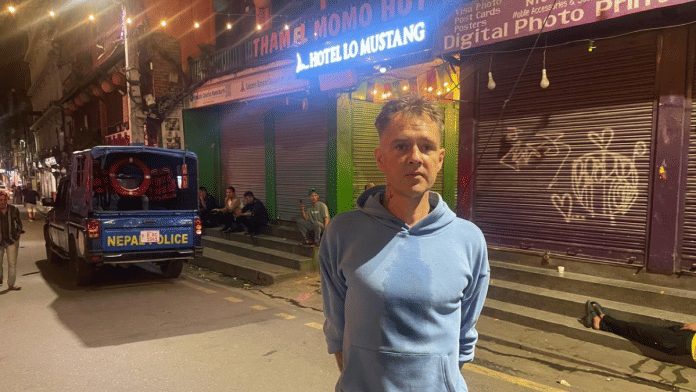Kathmandu: In Thamel, Kathmandu’s bustling nightlife zone, shuttered storefronts line the streets. A military curfew and days of protests have pushed most businesses to err on the side of caution. But foreign tourists still roam the streets, popping into the few open shops that sell everything, from trekking gear to local artifacts.
“It’s the best country in the world,” said John, a social worker from Finland, about Nepal. He is unfazed by this week’s violent anti-corruption protests led by the country’s Gen Z, which left over 50 dead. “Many countries have corruption, but the public doesn’t care. Here, people are burning everything, and I think it’s good—it needed to happen.”
John had come to the Nepalese capital city of Kathmandu three months ago, traveling around and enjoying his time in the city’s cafes. He said the protests would hopefully deter the country’s future politicians from taking bribes, though he voiced concern over the recent prison breakouts in the country.
“The only problem is the prisoners coming to Thamel in the nighttime,” he said, adding that the mass jailbreaks across the country under the cover of the chaos caused by the protests have made the situation more dangerous. “But I plan on continuing my stay here; I have faced no problems.”
While John had come to the country, which he sees as his second home, for a longer duration, most other tourists are in Kathmandu for shorter holidays. Their trekking plans have been delayed but not cancelled altogether.
“We were supposed to leave today (for the trek), but our guide couldn’t fly in because the airport was closed,” said Alex, from New Zealand, who had come to Nepal with three other friends. “But it looks like our plans are falling into place now.”
Alex, her partner Johnny, and two others watched the protest unfold from the rooftop of their hotel. At first, they had no information about the situation. It was only after the hotel staff filled them in that they were slightly more at ease. “But there was a point where we could see smoke rising, 20 meters away from us. That was scary,” she said.
“They were fighting against corruption. And although we were scared, we were rooting for them,” says Julia, a German tourist in Nepal.
Alternative options were discussed among the group, but leaving the country was the last resort, according to Alex. “We now have 15 days of trekking. Depending on the situation in the country after that, we will see if we should extend our trip,” she added.
Two women from Germany had also come to Nepal to explore the mountainside.
Anna and Julia, both of whom were traveling to the country for the first time, experienced a surreal change in atmosphere a day after they arrived. “On our first day, we experienced the city, and everyone was outside, stores were open,” said Anna, adding that the protests happened the next day. “Now it’s weird. Everything is closed and quiet.”
But Julia was quick to add that despite the change in their personal fortunes, they were happy for the people. “They were fighting against corruption. And although we were scared, we were rooting for them,” she said. Both women plan to continue with their trek.
Some tourists chose to completely immerse themselves in the situation by joining in the protests. Branislav (Serbia) and Maria (Spain) decided to walk with the large crowds towards the parliament.
“We liked the fact that the people are expressing their discontent,” said Branislav, who had come to the country for a spiritual holiday. The irony is not lost on him that the purpose of his trip took a different turn. “Of course, we weren’t part of the destruction, but it’s good to see young people fighting for their future. Otherwise, who will?”
(Edited by Ajeet Tiwari)
Also Read: Gen Zs have taken down the Nepal regime. Here’s why this will never happen in India






